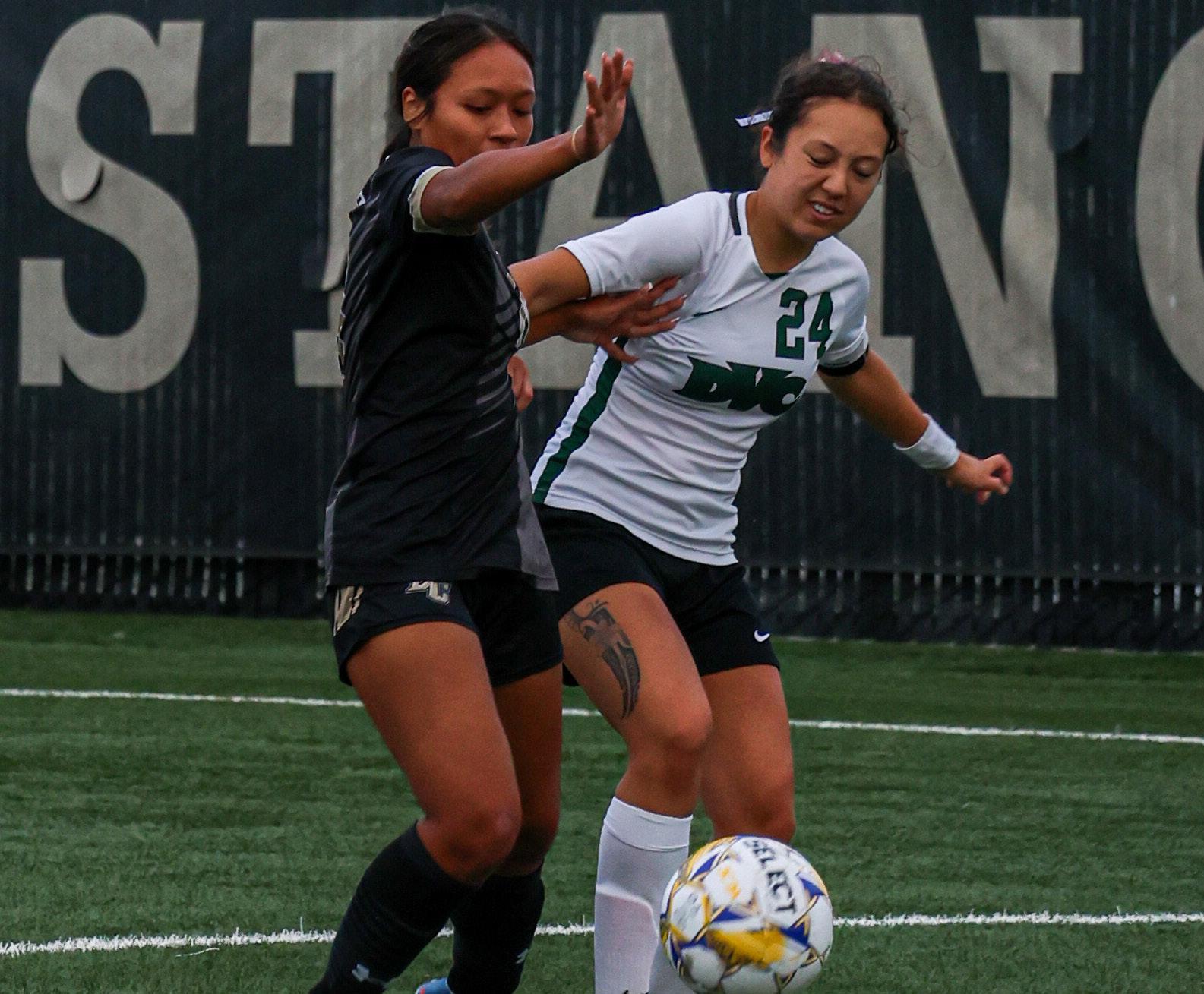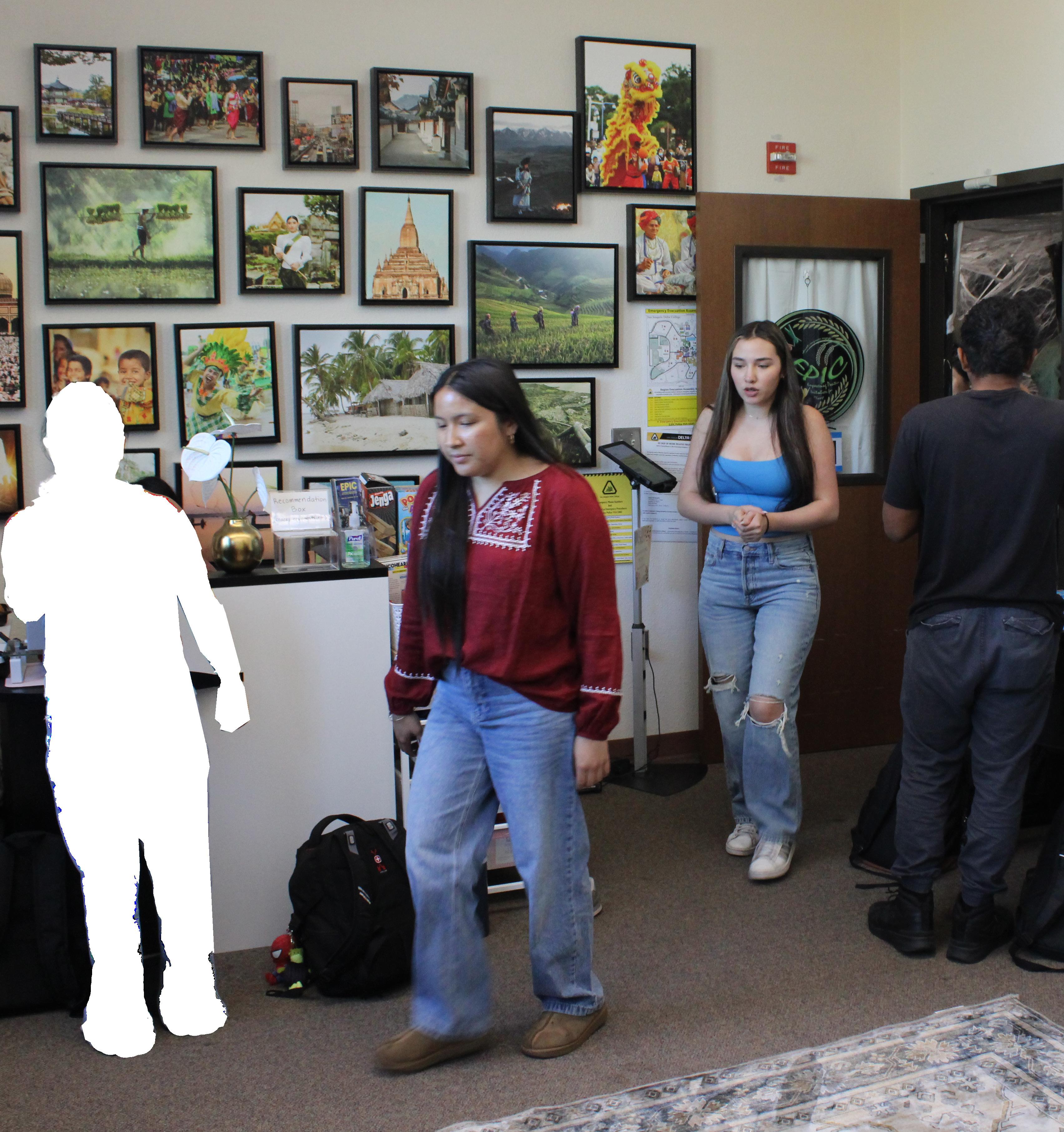








BY ANDREA BALTODANO Editor-in-Chief
In a federal rollback reshaping equity programs nationwide, Delta College is bracing for the loss of millions in aid that has powered its Asian American and Pacific Islander learning communities. The halt follows the Trump administration’s decision to end Minority-Serving Institution (MSI) grants, including those sustaining the college’s Empowering Positive Initiatives for Change (EPIC) Center.
The cut freezes the final two years of a fiveyear Asian American and Native American Pacific Islander-Serving Institutions (ANAPISI) grant that has funded tutoring, counseling, and cultural programs for hundreds of first-generation and immigrant students, according to public comments from faculty at the Oct. 7 Board of Trustees meeting.
State of Tennessee and Students for Fair Admissions, the group behind the 2023 Supreme Court case that ended affirmative action. Education Secretary Linda McMahon said funds will be redirected toward “race-neutral” initiatives.
“Statistically, I wasn’t supposed to be here.”
- Brandon Young
The decision is already facing legal challenges and motions to intervene. The Hispanic Association of Colleges and Universities (HACU) and other higher-education advocacy groups have filed to defend the MSI programs in Tennessee v. U.S. Department of Education, arguing the administration’s interpretation “misapplies the Equal Protection Clause and threatens decades of equity work.”
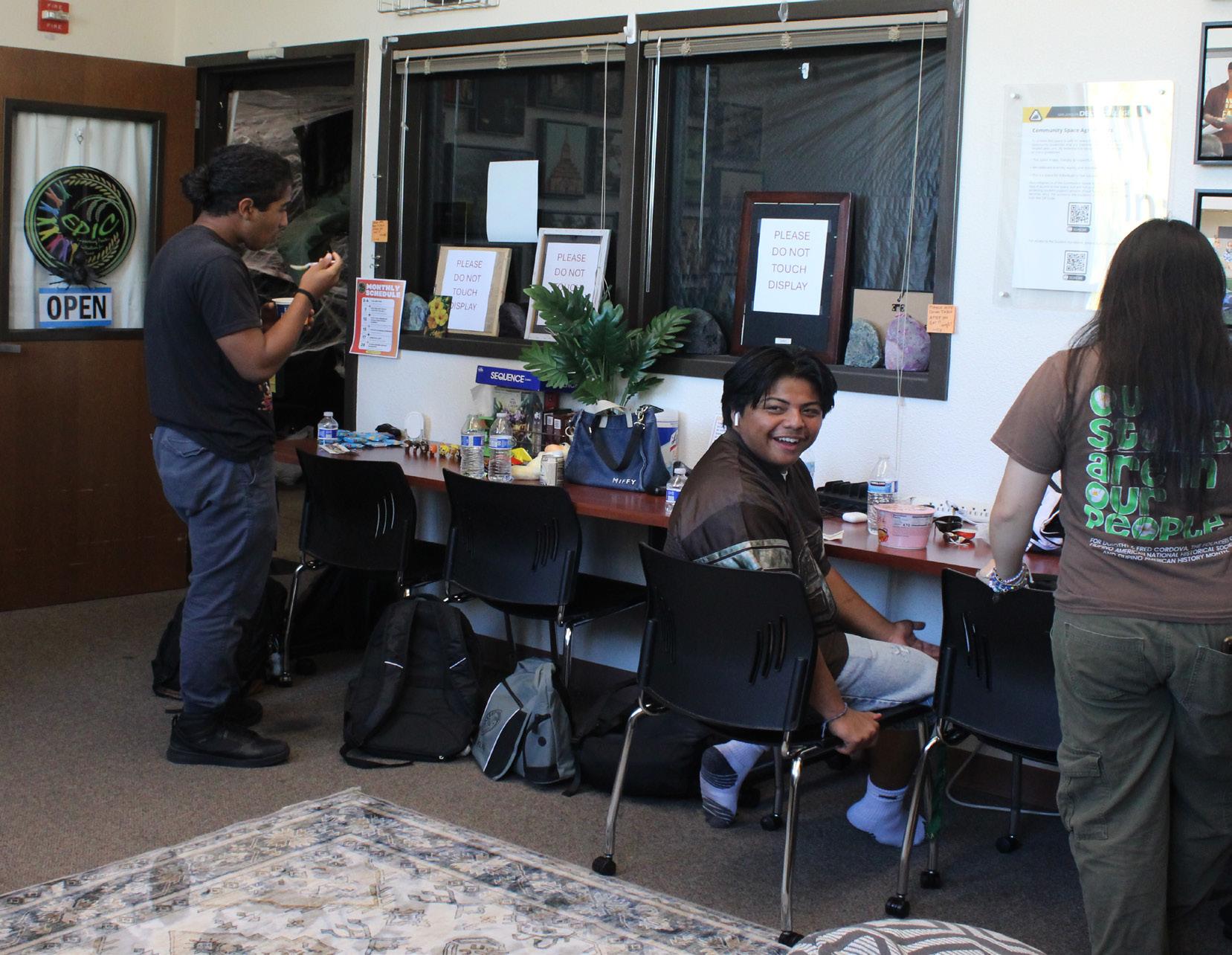
Faculty and students urged trustees to safeguard the program, while President Dr. Lisa Aguilera Lawrenson said the college plans to “institutionalize” EPIC — shifting it from federal funding to permanent college support — so services continue even after the grant ends.
At the board meeting, Lawrenson described the grant as “seed money” that was always meant to expire in 2027, adding that finding alternative funding sources has been part of the college’s plan.
“Fortunately, we have sufficient grant funds to sustain the program through September 2026, giving us time to develop a thoughtful and effective strategy. That said, we recognize the importance of moving forward with urgency. We will conduct a thorough review of the program’s budget and explore other funding opportunities,” Lawrenson said.
The Sept. 10 executive order freezes about $350 million in federal MSI grants nationwide, impacting Hispanic-Serving, Historically Black, and AANAPISI institutions.The administration argues such programs “rely on unconstitutional racial quotas,” citing a lawsuit filed by the
At Delta, the ANAPISI Part A grant — a five-year federal award that helps colleges develop academic and support programs for students — was awarded in 2022 and has funded the EPIC Center, a learning community offering linked courses, mentoring, and culturally responsive workshops for Asian American, Pacific Islander, and Filipino students. Housed in the Science and Math Building, EPIC also provides academic counseling, cultural celebrations, and leadership opportunities through the EPIC Club, according to Delta’s website.
“The program has been vital in advancing equity and student success for our communities,” said Eugene Gamble, president of the Asian and Pacific Islander American Staff Association.
“While the federal decision may be outside our control, our institution can still take decisive action.”
Dr. Cirian Villavicencio, political science professor and EPIC co-founder, called the decision “deeply misguided and harmful,” saying it dismantles programs that “expand opportunity and foster student success.”
During public comment, students described EPIC as more than a program.
Second-year student Brian Tao said the community helped him raise his GPA to 3.02. “EPIC gave me some-
thing much more valuable, a family and a home,” he said.
Brandon Young, a Hmong American student, told trustees that EPIC kept him in school after a four-year break.
“Statistically, I wasn’t supposed to be here,” he told trustees.
Anne Marin, vice president of the EPIC Club, called it “a family within the thousands of people at Delta College,” helping first-generation students “find belonging and confidence.”
EPIC’S RESPONSE
EPIC Director Susan Vang said the announcement blindsided campuses nationwide.
“We were all just surprised the day it came out,” she said. “The statement calling our work racist felt like a slap in the face.”
Vang said the grant supports the director, academic advisor, and counselor positions, as well as the EPIC Learning Community, which currently serves 35 students. The center has supported more than 150 students since the grant began, many of whom transferred to universities through their advising and mentoring network.
Despite the freeze, Vang said the
center will remain open through at least September 2026, using rolled-over funds and a no-cost extension from the U.S. Department of Education. “We’ll keep supporting students — budget or no budget — and get creative,” she said. “My center is not closed off to anyone. It may be AAPI-focused, but we have tons of students who find community here.”
Vang said she is collaborating with the president’s office and Academic Affairs to secure the program’s long-term future.
“We want to make sure that all three staff positions stay, that we don’t lose the counselor or advisor, and that we continue to grow,” she said. “The plan is to expand to about 100 students within the next few years.”
“Programs like EPIC close equity gaps and transform lives,” Villavicencio said. “Our students are watching. We must stand by them.”
Meanwhile, students and faculty continue to advocate for local support. Delta administrators say they are working to maintain the three grant-funded positions and keep the center’s services intact while awaiting statewide guidance from the California Community Colleges Chancellor’s Office, which did not respond to a request for comment by deadline.
Thismonth, two events miles apart revealed the same chilling truth: student journalism is under attack.
At Indiana University, the administration fired the adviser of the Indiana Daily Student after editors resisted an order to strip news content from their print edition. What began as a supposed “digital shift” quickly exposed itself as censorship in disguise. When the paper protested, its funding was cut.
The students responded with a bold front page stamped in red: “CENSORED.”
The uproar drew national attention from media watchdogs. As former editor-in-chief of Indiana Daily Student, journalist Annie Aguiar wrote for Poynter: “Admins are not your friend, despite what they say with a smile.”
Meanwhile, on the West Coast, The Stanford Daily and two international students filed a federal lawsuit against the Trump administration, arguing that its new immigration policy “turns the inalienable human right of free speech into a privilege contingent upon the whims of a federal bureaucrat” and allows deportation for protected political expression. The rule effectively puts international students at risk of punishment for their words, a direct threat to campus press freedom.
The Collegian joined the amicus brief supporting Stanford Daily in its lawsuit challenging federal immigra tion laws that let the govern ment revoke noncitizens’ visas for protected speech, includ ing opinions published in student newspapers. Our support stands on principle: no journalist should have to choose between their voice and their visa.
Both situations reveal the same pattern: in stitutions, whether academic or governmen tal, are becoming too comfortable treating journalism as a problem to manage rather than a pillar to protect.

And you don’t have to look as far as Indiana to see it. Just step inside Collegian’s newsroom.
This semester, we’ve had to fight for information that should be public. Basic questions about budgets, safety, or campus decisions are routinely redirected to the college’s Public Information Officer. We’re told again and again to “go through Alex Breitler.”
But when administrators refuse to speak directly with their own student journalists, and every question has to pass through a filter of “approved” language, that’s not transparency. That’s control.
No one’s confiscating papers or banning
The Collegian is the student newspaper of San Joaquin Delta College in Stockton, Calif. The paper is published six times a semester.
As a First Amendment newspaper we pride ourselves on a commitment to the students of Delta College while maintaining independence.
We reinvigorate the credo that the newspaper speaks for the students, checks abuses of power and stands vigilant in the protection of democracy and free speech.


The
trust erodes. When public employees paid by students and taxpayers hide behind talking points instead of answering questions, they undermine the transparency our education system claims to value.
Student journalists aren’t a PR inconvenience. We’re watchdogs. We document what happens here: on this campus, in this community and in this moment.
The Indiana Daily Student refused to print silence. The Stanford Daily took the federal government to court. And Collegian will keep asking the questions our admins don’t want to answer.
BY ZACKARY KIRK-NEWTON Editor-in-Chief
On Oct. 18, as a part of the nationwide “No Kings 2” protests, there was a demonstration held in front of San Joaquin Delta College on the intersection of Pacific and Yokuts avenues
This is the second No Kings protest held at Delta College, after another large demonstration in June.
The event brought together many local groups including SJC4DEI, Indivisible Stockton, Food not bombs and Asian Pacific American Public Affairs (APAPA).
The prevailing mood was one of frustration as protesters lined Pacific Avenue with signs criticizing the current president, his cabinet, and many policy decisions.
“I came out today because I want to stand in solidarity with Stockton voters in San Joaquin county to wake up to the fascism takeover that we’re having within our federal powers,” said Alyssa Leiva, who works with local youth-led social justice advocacy group, Stockton Stands.
Barbara St. Urbain, who runs the San Joaquin Coalition for Diversity, Equity and Inclusion (SJC4DEI), also attended the event.
“I wake up every day more dismayed about what’s happening to our constitution, to our democracy, to the idea of ‘We the people,’” said St. Urbain
St. Urbain, who also served as cochair of the event, spoke about the amount of people at the event.
“What I’m hearing from everybody is that it’s even bigger than June 14 and we had about 2,500 people then. So I’m estimating 3,000, maybe 3,500,” said St. Urbain, who also noted the diversity among the people attending. “All the different groups that we want represented, they’re here.”
Delta faculty also showed up
“I think that the average person is either not paying attention entirely or they have one foot in one foot out,” said Dr. Alberto “Beto” Gutierrez, who teaches ethnic studies at Delta. “I think it’s important for them… to see that there is a significant percentage of society who is paying attention that is discontented.”
Guiterrez, a Los Angeles native, also stressed the importance of attending a local protest.
“Rather than driving to the Bay and being a part of a bigger protest, I’d rather come here and add one more number,”

said Gutierrez. “I think it’s important because it shows that there is a shift in local ideology. It’s important for people to understand that this entire Central Valley isn’t red.”
“I think it’s great that Delta College is not like some places that are afraid and that would shoo people away” said Shelly Swanson, Delta trustee for Area 1, who attended the event.“They want to support the causes that do help their students”
Some of those present there was a hope that community involvement wouldn’t stop at just the protest.
“This is more to build morale and let everyone know that there are other people out there that are with them in resistance,” said Riley Schlaier, who attended the event as a member of Food Not Bombs, which provided food for protesters.
Schlaier argued that while keeping morale up was good, it was unlikely to create change.
“One of the critiques that we have of protests in general is that it’s more of a rally than a protest,” said Schlaier, suggesting that time should also be spent volunteering. “Personally, what I recommend and what the org in general recommends, is that people find local leftist organizations and contribute their time.”
On the national stage, nearly 2,700 “No Kings 2” protests took place with more than 7 million participants, according to the No Kings website.

BY RYCKIE HEREDIA Staff Writer
On Saturday, Oct. 18, the Dreamers Success Center held its annual Dream Conference
Seventy-three students attended the day-long event, which featured resource tables and informative presentations. In total, the event welcomed 124 people, including volunteers.
The Dream Conference is now in its seventeenth year.
The event started with a light breakfast before attendees listened to guest speakers chosen to raise awareness about their professions.
The speakers included: Maria Navarro, a former San Joaquin Delta College student, Leslie Sanchez-Valenzuela, Financial Aid Outreach Support Specialist, Dr. Heather Maloy, Dean of Instruction — DARTE, Vannessa Plaza, Student Programs Specialist for Delta Health Center/Wellness Services, and Yasmin Martinez, CA Senior Organizer from United We Dream - California.
“No student should navigate college with no support, and every undocumented student deserves a place where they are seen, valued, and empowered,” said María Navarro, Project Coordinator, Pre-Health Dreamers.
The Dreamers Success Center (DSC) focuses on supporting students who are
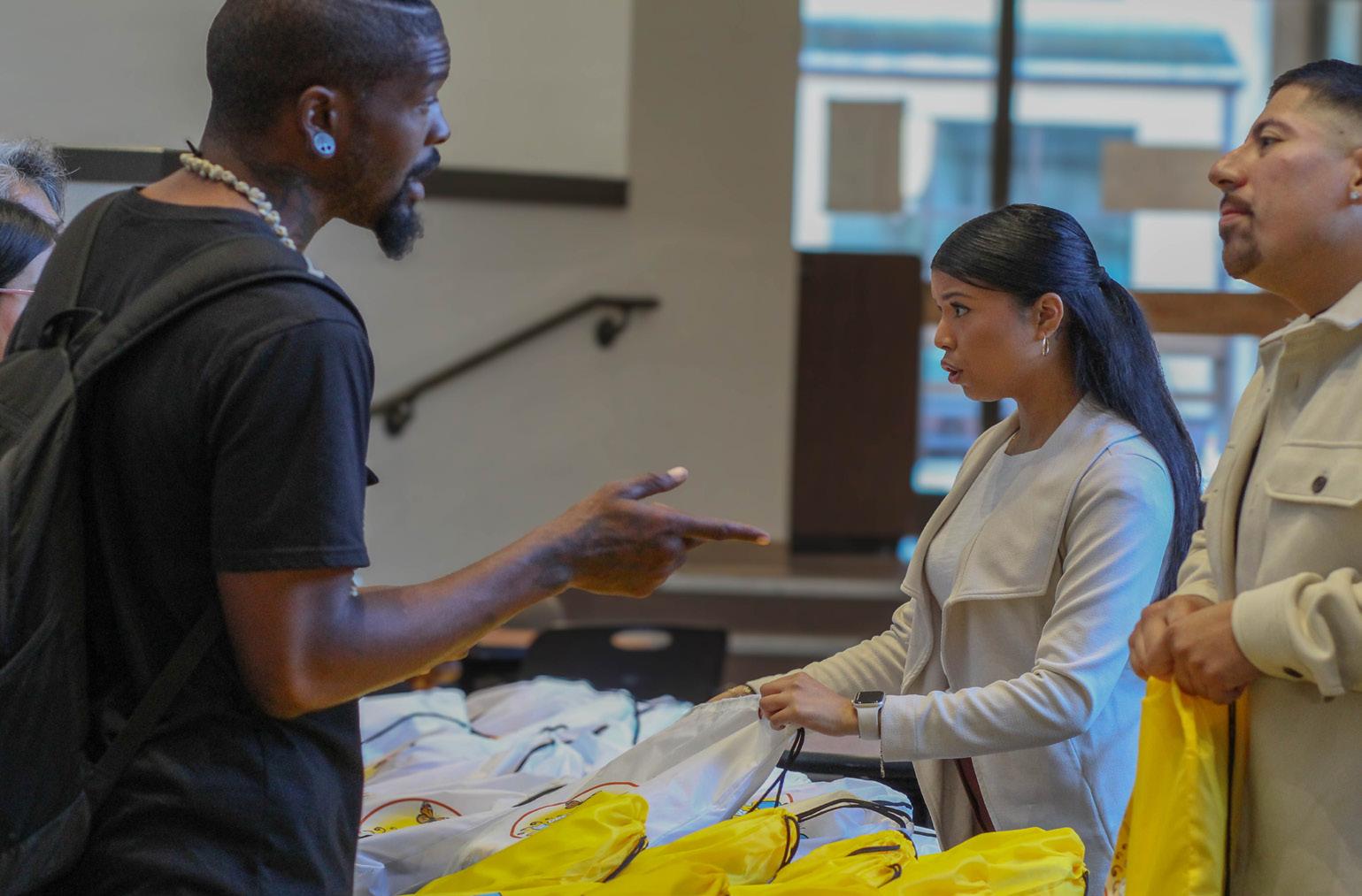
BY RYCKIE HEREDIA
Undocumented, of Immigrant Status, AB 540, and recipients of Deferred Action for Childhood Arrival (DACA) by offering free legal and counseling services, among other available resources.
The Dreamers Success Center began at San Joaquin Delta College on Oct. 19, 2022. The center was established to provide support and protection for undocumented students.
The Dreamers Success Center’s goal is the right for everyone to be able to pursue higher education without fear of one’s immigration status. The path for undocumented students in pursuit of higher education requires more determination, strength, and resilience than should be expected, or is fair, according to the San Joaquin Delta College website.
Many individuals don’t understand the impact of these events.
The event included a raffle throughout the day, with multiple gift baskets of school supplies, multiple different gift cards worth more than $250, and T-shirts, all of which would not have been possible without the assistance of Dr. Alina Sala, associate professor of counseling, who donated all of these gift cards.
Tina Leal, the Resource Specialist within the Dreamers Success Center, routinely distributes leftovers after large events to ensure that no food goes to waste.
She sets up a table with her husband downtown by McDonald’s or goes a little farther down by St. Mary’s, where they have feeding periods at specific times, and she feeds the homeless. Leal said: “That they are just so grateful for the food.”
Leal thanked those who help put on the conference, but also echoed a statement she says at the end of all of her presentations.
“I always say this in my presentation, at the end of my presentations, es tu casa, so this is your house at the Dreamers Success Center,” said Leal.
For more information, visit the San Joaquin Delta College website at deltacollege.edu/department/dreamers-success-center. Follow the center on Instagram at instagram.com/dreamerssuccesscenter.
BY LAYLA CARRASCO Staff Writer
Delta College students shared personal stories of trauma and resilience Oct. 15 at the Dreamers Success Center during Pushing Ahead, Living into Legacy: Avanzando el Legado, a wellness event led by Dr. Felipe Mercado.
The program, part of Undocumented Student Action Week, examined how childhood trauma physically impacts the brain and can shape identity and academic performance. Mercado, an assistant professor at California State University, Fresno, and founder of Wise Souls LLC, helps schools and communities build trauma-responsive systems.
Mercado said students with adverse childhood experiences,
such as abuse or incarcerated family members, have a 17 percent chance of completing college compared with 70 percent for those without such experiences.
He explained neuroplasticity, noting that when students feel safe and connected, their brains “turn on” and begin building new pathways for learning.
Mercado offered what he called “wisdom from the streets to academia.” His advice included building self-belief, seeking mentorship, staying focused on goals, creating positive environments and embracing authenticity.
Student ambassador Tina Rocha, a digital media and English major, said the presentation helped her connect her
own medical history to Mercado’s science.
“I did not know that the traumas that we experienced really impact our brain,” Rocha said. “My strokes happened in those regions that are most impacted.”
A triple stroke survivor, Rocha said her strokes occurred within months of each other while she cared for her dying mother. She added that Mercado’s presentation emphasized the importance of connecting through storytelling.
“We have a human need to connect through our stories because we don’t have to have the same background to connect,” Rocha said. “It’s invaluable to know that we have a tribe.”
Second-year digital media student Yaritza Vaca said Mer-
cado’s message of persistence and resilience resonated with the Stockton community.
“No matter your background or struggles, you can become successful,” Vaca said. “Stay persistent, motivated, and surround yourself with the right people.”
Mercado’s journey from homelessness, incarceration and addiction to becoming an Emmy Award-winning advocate and six-time Amazon bestselling author now shapes his wellness work.
During the discussion that followed, Digital Media Professor Adriana Brogger praised Mercado’s ability to connect with students.
“It’s incredibly powerful to hear a real story,” Brogger said.
“In today’s rush of life, we very
rarely get to hear someone’s authentic narrative.”
Brogger told students they represent the next generation of leaders.
“We’re looking at future educators and policymakers,” Brogger said. “Instead of wishing, let’s lean into what we can do.”
Rocha encouraged other students to attend similar events at the Dreamers Success Center.
“You’re going to connect with others,” Rocha said. “You’ll hear something that resonates. Little by little, you find greater purpose.”
The Dreamers Success Center provides free legal and counseling services for undocumented, immigrant, AB 540 and DACA students.
BY JARRED WRIGHT Senior Staff Writer
Delta has negotiated a memorandum of understanding between the District and the San Joaquin Delta College Teacher’s Association to facilitate the development of an “Environmental Science and/or Regenerative Agriculture Certificate Program.”
The memorandum, made effective Sept. 10 and approved by the board on Oct. 7, will be funded through private grants from California Resources Corporation (CRC) and Carbon TerraVault (CTV).
The program, still under development, currently consists of two parts: a regenerative agriculture certificate and a carbon management sciences certificate.
“We we are looking at how we can capture carbon in the soils … which obviously leads towards … higher temperatures, climate change … regenerative ag is a way to increase our ability and improving the status of the environment through our farming practices,” said Lindsay Hofsteen, a plant science professor involved in the program.
At Delta, the program under development is being led by professors Tina Candelo-Mize, Hofsteen and Theron Sowers, who specialize in horticulture, plant science and geology respectively.
The regenerative agriculture certificate is being developed in partnership with California State University, Chico professor Cynthia Daley, who heads the Center for Regenerative Agriculture & Resilient Systems at Chico.
“We’d like to have is a program that’s essentially a pathway for students into that program at Chico and so it’ll prob-
ably be an associates degree … that way students can finish here at Delta after two years and maybe enter directly enter the workforce or they have the option to go to Chico state where they can continue their education in regenerative ag,” said Candelo-Mize.
While regenerative agriculture deals primarily in the agriculture industry, the planned carbon management sciences certificate is intended for those interested in where the agriculture and energy industries meet.
In the works are the development of new classes, including Introduction to Regenerative Agriculture, Introduction to Biotechnology, and a geology class relating to carbon sequestration.
“There’s one new course that will be developed. There are two courses that are not launched in the catalog quite yet … [they are] currently moving through the curriculum approval process and then there will be a geology class that will be developed to support understanding the science of carbon sequestration at the geological level, so that’ll be a new class. And then once that class is developed, then we can put it all together and launch the certificate,” said Candelo-Mize.
While updating existing courses does not require additional funding, according to Acting Associate Vice President of Career Technical Education and Workforce Development Joe Gonzales, a $2,000 stipend will be allotted to the faculty involved for the development of the new courses and other related work.
The new courses are expected to be launched by the summer of 2026 with the certificates ready the following year, pending approval.
The programs are also intended to

focus on fulfilling local industry needs and providing the training and knowledge for students to do so.
“They could be farm managers, production managers … grower relations is another career. There’s also a demand for people in grazing so one of the aspects of regenerative ag is grazing livestock,” said Candelo-Mize.
According to Candelo-Mize, the programs’ implementation was in part inspired by the local industry publications on sustainability done through local bodies like the Lodi District Grape Growers Association.
“We pay attention to local labor market demands to prepare students for workforce realities upon graduation …
we are working with industry to support this endeavor. All of our programs allow students to directly enter the workforce, this will be no different,” said Dr. Katrina Johnson León, Dean of Applied Science, Business and Technology.
As program development continues, Hofsteen, who worked in wine before becoming a professor, receives feedback from the community, including from those in the wine industry
“We’re just starting to build those connections for going out into the wine industry so I do have a couple folks … in my advisory committee … but there’s always an opportunity to add more folks,” said Hofsteen.
BY LEVI GOERZEN Sports Editor
On Oct. 10, California Governor Gavin Newsom signed 40 new pieces of legislation. Among these was Assembly Bill 1127.
Originally proposed on Feb. 20, the bill aims at the sale of firearms that can easily be converted into automatic firearms.
The law aims to convince firearms manufacturers to stop production of firearms that can be easily modified with a “Glock sear.”
“The Smoking Gun,” an advocacy group whose goal is to expose American gun violence and its causes, defines a Glock sear, as “devices that convert semi-auto-
matic firearms, which are designed to fire one shot per trigger pull, into fully automatic machine guns.”
As defined by the Bureau of Alcohol, Tobacco, Firearms and Explosives (ATF), a machine gun is “Any weapon which shoots, is designed to shoot, or can be readily restored to shoot, automatically more than one shot without manual reloading, by a single function of the trigger.”
The National Rifle Association Institute for Legal Action(NRA-ILA) plans to pursue legal action against Newsom, claiming that banning the sale of any gun goes against the Second Amendment.
“Our message to Governor Newsom is simple: we will see you in court,” said John Commerford, NRA-
ILA Executive Director.
According to a press release from the office of District 46 Assemblymember Jesse Gabriel, district 46 covers Anaheim and Santa Ana, a large reason for the introduction of this bill is to help reduce school shootings by making guns commonly used in school shootings illegal.
“As parents and lawmakers, we refuse to stand idly by while our schools and communities are being threatened by illegal machine guns,” said Gabriel.
Guns classified as semiautomatic machinegun-convertible pistols will be affected by AB 1127 and will not be able to be sold after July 1, 2026. Any properly registered firearm that is also deemed safe by the California Penal Code will not be revoked.
BY BELINDA SEIBEL Entertainment Editor
On Oct. 17, Delta hosted its fourth annual Fierce’s Fall Fest in CTE-Land, a community Halloween event open to all.
The event is to highlight Delta’s Career Technical Education (CTE) programs in a way that’s fun for kids and informational for adults, with Delta’s diverse number of programs having booths that offered games and trick or treating for kids, and career and education information for adults.
“It’s reaching out to our

community to let them know we’re here and we have real life opportunities within our local area. Creating that level of awareness and access, and ultimately student success leading to community success,” said Sokun Somsack, Strong Workforce Program Director at Delta and organizer for the event. This year was K-pop themed, with over 4,300 people attending and participating in activities such as face painting, pumpkin decorating, a costume parade and a dance party with Delta’s mascot Fierce the Mustang.


Clockwise: Raul Monroy Duran, a student at San Joaquin Delta College, plays a guitar at Fierce’s Fall Fest on Oct. 17, 2025.
Selina Mariscal of San Joaquin Delta College’s Division of Arts hands out candy to a young witch.
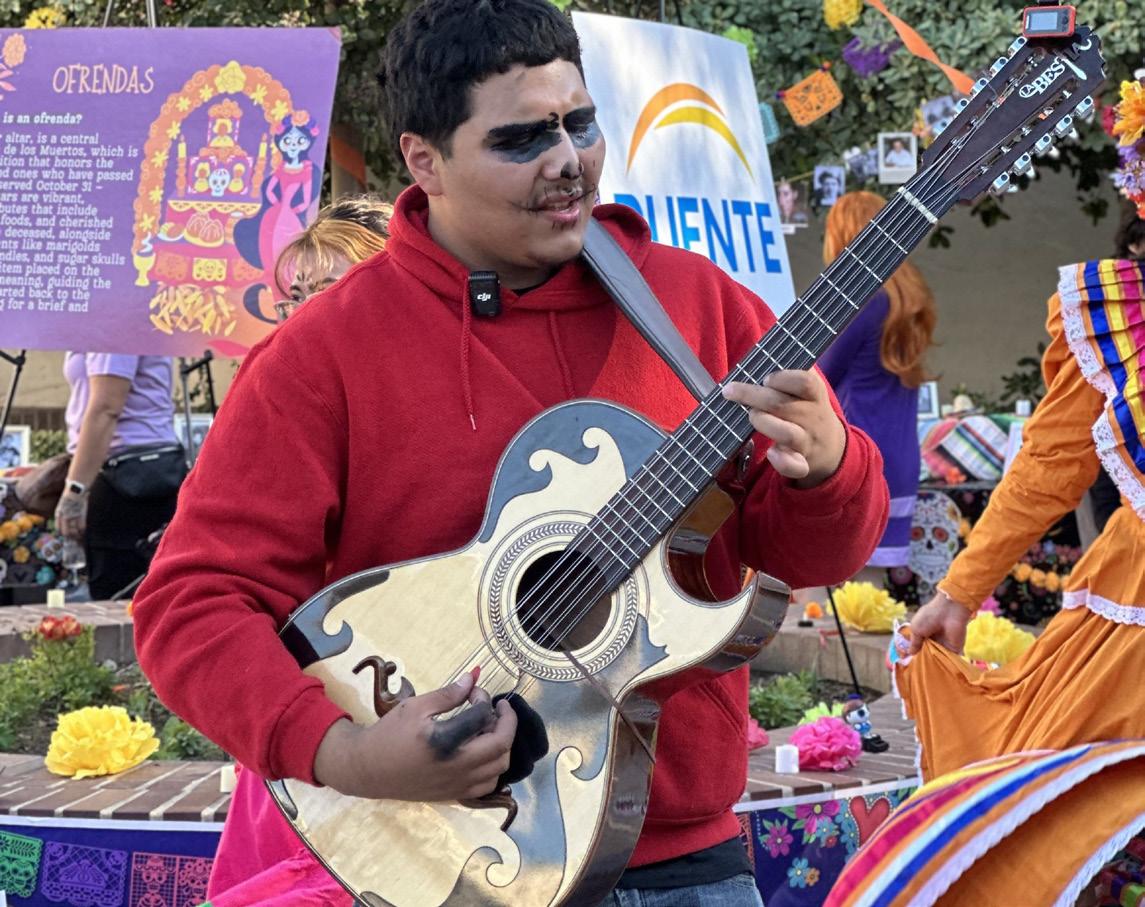


BY JOHN NGUYEN Feature Editor
The Holt Center is a tall building, and there’s several steps and floors to look up to on the way to class that one might pass a little, open corner tucked into the stairs without noticing its existence.
The stairs of the Holt Center feature a niche that a person can comfortably fit into, where they can rest their feet and take an elevated view of the floor below. No other building on campus features stairs with a similar niche, including the since-removed Cunningham Building.
Though the niche in the Holt Center stairs may look like empty space, the spot has quite some history attached to it.
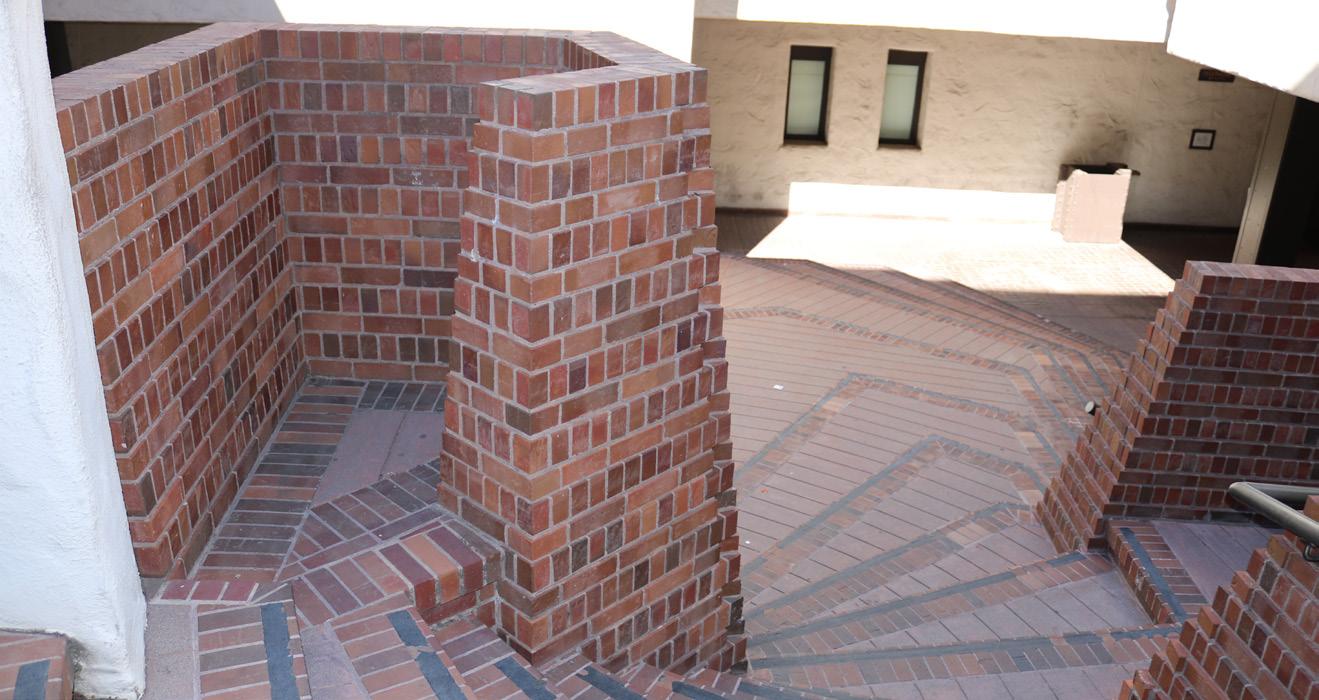
According to Charles “Chuck” Bloch, retired Delta instructor, the niche saw use by the late Ralph Prime, former Director of Choral Organizations and Handbell Choirs, as a conductor’s stand. During the Delta College Handbell Choir’s annual Christmas program, Prime would lead his performers down on the floor of the Holt Center. According to a Stockton’s Top Arts Recognition Award honorees information sheet provided by Delta, the ensemble grew to include a full five octave set and a Giant G2 for a total of 73 bells by 1983 after Prime’s fundraising efforts.
The Handbell Choir’s Christmas program lasted from around 1972 to 1989, with Prime retiring afterwards. Prime was not succeeded as the director of the Handbell Choir.
According to Bloch, the niche in the Holt Stairs was also used for similar performances by an a cappella choir at Delta, as well as a string quartet.
Since then, the niche in the stairs has rarely seen
use for performances or demonstrations in recent. Collegian asked students on campus for their suggestions on what the niche in the Holt Center stairs could be used for.
“A little space where, maybe get a chair – make it closed off – so if anyone wants to have a minute to themselves and be alone. So yeah, they could have it there,” said Ema Fua, Associated Students of Delta College President. “If they want to have a mental breakdown, they can have it there.”
Fua also considered the niche’s potential as a speaking platform with the addition of a podium, and thought to get rid of the niche if it could not be repurposed.
Fatima Jauregui, a second-year Nutrition student at Delta, had never known about the niche in the Holt Center stairs prior to Collegian inquiry. When shown
the niche, they shared similar opinions to Fua, and also considered its potential as a space for unhoused people to sleep in.
“I think this could be … good public speaking … give out a speech if people wanted to … Probably put something here, a pedal, stool or something,” Jauregui said.
Sidney Gurr, a first-year Forensic Science student at Delta, was previously invited to the niche in the stairs as a meeting space to talk with three of their friends. They complain about the niche’s lack of capacity for gathering.
“Considering how small it is and it’s so tucked away, I didn’t notice it until my friends brought me there,” Gurr said.
Adnar Thomasson, a second-year Psychology major at Delta, shared his thoughts on the niche, suggesting it could be used as a space for plants.
“I think it’s kinda pointless. I feel like it would be better use if it was like, even plants in the middle of it. It feels weird, tight and odd,” Thomasson said. “I feel like a planter with flowers is good enough honestly … I think a flowerbed would be great. It’d be nice, add some fresh air … Hell, maybe even like a small tree or something. Just something very blossoming.”
Lucas Messner, a first-year student at Delta, questioned what the niche could be used for.
“It’s a small space, so I’m not really sure what could be put there apart from like – a water fountain,” Messner said.
Yvio Pierre, a first-year student at Delta, suggested that the niche could be a space to dispose of garbage, if a waste receptacle was placed there.
BY ZACKARY
On Oct. 13, San Joaquin Delta College’s digital mental health service, TBH, was replaced with Massachusetts-based online therapy platform, Uwill, following Uwill’s acquisition of TBH in August.
An email regarding the change was sent out to all students on Oct. 2 with a follow up shortly after for students that had previously used the TBH platform with instructions on how to transition their accounts.
“Our concern has been to make sure that students already using TBH were able to tran-
sition into Uwill,” said Alex Breitler, Director of Marketing and Communications for Delta College. “You have students who, maybe, have a relationship with people through the TBH platform and… you want the disruption to be as minimal as possible.”
Thousands of students at Delta have used the TBH platform, Breitler said, but the amount who have transitioned to Uwill successfully is currently unclear.
Another looming question was one of continuity: even if students can transfer their data, would the professionals and therapists they met through the TBH platform follow them?
“Uwill invited all TBH coaches and providers to continue their work on the Uwill platform in similar roles. I’m not sure how many are doing so,” said Breitler in an email.
While the platforms are largely similar, they do differ in key ways.
“The same day access to a therapist will actually be an improvement over what students currently have with TBH,” said Breitler.
This improved access does come at a price, however. Uwill does include a credit system which was not present in the TBH system.
“There’s no change in the amount of support Delta stu-
dents will receive under Uwill. Students will continue to receive up to 12 sessions per year,” said Breitler.
However the TBH tile lingered on student’s dashboards until at least Oct. 16 — three days after the switch — to facilitate the use of TBH’s unique basic needs resources.
Students who clicked on the tile were redirected to Uwill’s home page.
“The issue there is that we’re using TBH for some basic needs,” said Breitler. “The basic needs transition has not yet taken place.”
While the Uwill home page does have a basic needs button, it is currently not functioning,
and with the TBH tile redirecting to Uwill, there appears to be no way to access basic needs functionality.
These basic needs features were a primary reason that Uwill took an interest in the TBH platform.
“Today’s students are balancing academic demands, jobs, and family responsibilities — sometimes without reliable access to essentials like food, housing, or transportation,” said Michael London, founder and CEO of Uwill in a press release announcing the acquisition “Supporting student mental health means addressing these fundamental needs.”
BY ELENA CANDELAS Staff Writer
The Philosophy Club explored crime and punishment in its Oct. 14 meeting, the first of two meetings focused on the topics in October.
Horror as a genre was previously discussed by the club a year prior. This year’s discussion, however, diverged from horror as a genre to the actual application of crime and punishment.
Layla Alaswad, Vicent Champean and Valerie Romero are three of the officers present at the meeting.
The club generally follows open discussion forums in its operations as the promised short film by Matt Richards, “The Disappearance of Willie Bingham,” was the topic of discussion amongst the members for the meeting.
The short film follows a dystopian world in which certain crimes result in amputation over time as punishment.
The film prompted a discussion amongst the small group of approximately 10 participants about both the crimes committed and the equivalency of the punishment.
Romero, a second-year stu-
dent and officer, was responsible for the choice of film. Taking pride in their choice, they expressed the significance of the conversation prompted by the film.
“So I think it’s very important ‘cause even though it’s more of like a contemporary film like fictional... But I think it’s important [to discuss this topic] ‘cause there’s some like a lot of aspects of those films and that like that topic there’s some truth for them… there’s some issues, there’s quite a bit of issues in the penal system I believe there’s a lot of not a lot of but there’s significant cases where there’s abuse of power,” Romero said.
The members present at this meeting explored these power imbalances freely, allowing for an open discussion. This open forum of philosophical discussion without class commitment was what founding member Alaswad cited as one of the reasons for the club’s creation.
Accessibility was her concern and the club aims to fill a hole that colleges and universities leave behind.
“And a lot of colleges don’t really care to like focus on phi-
losophy as it’s kind of seen as a dying tradition,” said Alaswad.
Delta doesn’t offer philosophy AA to transfer degree or a philosophy degree program in general. This was a point made by Alaswad who said the club was assembled as a place for her and others to explore philosophy.
“So, I kind of made the Philosophy Club as an accessible way for people who are interested in philosophy but maybe don’t want to dedicate an entire class and their schedule or do anything super like advance into it they can get like a little bit of it in their like day to day life as a student,” said Alaswad.

of reading.
The club aims to foster growth in critical thought through not just film but also literature. Romero and Alaswad said they hoped people take away from this club a love
“Like if you’re not interested in philosophy that’s perfectly fine but the big thing is that you are willing to read … I want to ensure that like when they transfer even if they’re like a completely separate major … I want them to be willing to read things that scare them, that are long, that are hard, that are difficult,” said Alaswad.
Romero gave a similar an-
swer.
“I feel as though a lot of people aren’t interacting with sort of philosophy books or sort of older texts anymore, and I feel as though there’s a lot of good information there and especially themes that can be relevant still today,” Romero said. The club will host its next meeting on Tuesday, Oct. 28 discussing the same topic in Budd 407 at 12 p.m.
BY MAX OLMSTEAD Staff Writer
Halloween may be a bit hot this year, and not for the right reasons.
Accuweather is predicting the high for Oct. 31 to be 77 degrees, which will be above the high 60s felt in 2024.
For the last couple years, young adults on social media have considered a future of warm Halloween nights. Many retell stories of having to ruin their perfect costume by wearing a jacket. The pleading with your parents to let you freeze if it means you can be Spider-Man in his unaltered glory. It’s an experience many have dealt with, and have realized future generations may not need to.
Are we finally having warm enough fall seasons to ditch the jackets? Not likely if current predictions hold. Accuweather predicts the Stockton area
won’t break back into the 60s as a high until at least Veteran’s Day.
“I have noticed it’s been hotter this year,” says Angela Bingham, a second year student at Delta. “We’re in the stage of the year that’s called false autumn, and it’s terrible.”
According to Weather Underground, a weather resource database, the high temperature in Stockton was 84 degrees on Halloween 2015, with the record high at that time being 85. On Halloween 2016, there was a far lower temperature with the high of the day being 67, and again in 2017 with the high of 69.
Temperatures rose again by 2020 with the high being 81 degrees, but followed the same pattern of dipping down into the 70s and 60s from 2021 to 2023.
In 2024, Stockton saw a high of 67
degrees. This year we are expecting a high of 77.
Despite temperatures following a pattern of rising and falling throughout history, California’s location and its carbon emissions play a role in its future climate trends.
According to the National Oceanic and Atmospheric Administration (NOAA), California has experienced significant marine heatwaves for the past six years. The NOAA states that these marine heatwaves impact the offshore areas in spring, and start having an effect on the West Coast by fall, explaining the frequent hot days in September-October.
Because of rising ocean temperatures, much more water is evaporating, and creating a more humid environment that spreads inland from coastal winds.
On a more local scale, Cal-Adapt (a
peer reviewed collection of climate data from UC Berkeley) predicts that in the coming century we will see an increase in the length and frequency of heatwaves in areas surrounding the Sacramento Valley.
Their research models also show that we can expect about a six degree increase in temperatures by the end of the century. This simulation considers the effects of high carbon emissions as a factor in how severely temperatures will increase, with six degrees being the predicted result with high emissions. The change in climate will be gradual, and it’s not quite time to fully abandon the jacket. Although this year is expected to be a comfortable temperature, it may be a possibility in the future that the scariest part of Halloween will be the unbearable heat.
BY LEVI GOERZEN Sports Editor
On Dec. 17, 2024, the San Joaquin Delta College Board of Trustees voted unanimously to approve Resolution #23-030, reaffirming Delta’s status as a sanctuary campus.
The specific verbiage in the resolution notes Delta’s commitment to “provide educational opportunities for all” in a commitment to “maintaining a climate of inclusion” and “preservation” of the Deferred Action for Childhood Arrivals (DACA).
The idea is to protect immigrant populations and limit cooperation with immigration officials, but what it means for Delta College and cities that have elected to designate themselves as “sanctuary” is often much broader.
In the 10 months since the local declaration, President Donald J. Trump signed multiple executive orders with the intent of removing the protections sanctuaries may provide to individuals.
“The Attorney General and the Secretary of Homeland Security shall, to the maximum extent possible under law, evaluate and undertake any lawful actions to ensure that so-called “sanctuary” jurisdictions, which seek to interfere with the lawful exercise of Federal law enforcement operations, do not receive access to Federal funds,” said a Jan. 20 executive order.
Delta College’s sanctuary policy is aimed at reassuring students and protecting them on campus.
“We want to make you guys feel safe,” said Tina Leal, Resource Specialist for the Dreamers Success Center on the Delta College campus.
For Delta College, reaffirming itself as a sanctuary campus means it is “committed to protecting the rights, dignity, and well-being of all students, including undocumented individuals, and ensuring their ability to pursue education without fear or barriers,” according to the resolution.
“By affirming our sanctuary campus status, you are sending a clear message that all students belong here and their
education matters,” Leal said during public comment of the Dec. 17, 2024, meeting. “The resolution is critical to ensuring that fear and uncertainty do not become barriers to education. This is consistent with our mission statement.”
Students who utilize resources at the Dreamers Success Center also spoke in support of the resolution.
“I want my family to be safe, I want to be safe, I want my friends to be safe,” said one student, who Collegian is not identifying due to the sensitive nature of the comments.
Collegian reached out to President/ Superintendent Dr. Lisa Aguilera Lawrenson for comment, but received responses from Delta College Director of Marketing and Communications Alex Breitler.
“The idea behind these resolutions was to reassure our campus community that we are here to support all students, regardless of anything that may be happening at the federal level that is beyond our control,” said Breitler.
The act of becoming a sanctuary campus doesn’t change policy and procedure. Instead, it affirms the college’s values when making new policies, such as “Board Policy 5111 Student Directory Information.”
“While the Sanctuary College designation is largely symbolic and does not override federal law,” said Acting District Chief of Police Tammie Murrell. “It serves as a powerful statement of our commitment to student support.”
Policy 5111 directs: “No District representative shall release the contents of a student record to any member of the public without prior written consent of the student other than directory information.”
Under the policy, directory information is limited to participation in officially recognized athletics as well as any degrees or awards earned by students.
California Education Code 66093.3 has additional guidelines on when student information can be shared. The code limits disclosure of information on students, faculty and staff except in certain situations, such as in response to a judicial warrant or court order.
“It is still possible that immigration officials will come to Delta at some point in the future. We do not have control over whether they enter our campus. Anticipating this possibility, we have informed employees that student information is not to be made public,” said Breitler. “And that any immigration official who comes to campus should be escorted to the president’s office for evaluation of a warrant or any other legal documentation.”
The campus sanctuary declaration is largely untested. However, the sanctuary status catalyzed other campus reactions specific to those protections.
At a district in-service event in August, Student Protection for Advocacy Resources and Knowledge (SPARK) presented scenarios to staff for if immigration officials came to campus. The direction of the scenarios was to send officials to the President’s Office.
SPARK is a project charter with the goal of supporting and advocating for “vulnerable” student populations and ensuring the district does everything in its power to protect students’ rights.
“It was more so because of everything that was happening with undocumented students and how much that would be affecting our students here,” said Multimedia Coordinator and Delta Pride Coalition member Leo Marquez. “So we decided we need to create some type of task force of those who are available to come together when we notice there are things that are happening politically that we should address as quickly as possible for our students.”
Campus signage directs visitors to “Know Your Rights.” The Dreamers Success Center also regularly hosts workshops covering immigration law updates and constitutional protections.
District police also aren’t supposed to aid any Immigration and Customs Enforcement (ICE) officers if they were to show up on campus. Instead, they are supposed to direct ICE officers to the president’s office.
“If federal immigration officials were to arrive, our protocol is to escort them to the Office of the President for verification of legal documentation, such as a warrant,” said Murrell, “This ensures that any action taken is in full compliance with the law and respects the rights and privacy of our students.”

The Collegian believes that journalism should do more than spotlight what’s broken. It should also search for what’s working. This year, our newsroom is proud to join the Solutions Journalism Student Media Challenge, partnering with the Solutions Journalism Network to bring meaningful, solutions-focused reporting to our campus.
In this issue we are launching “Beyond the Border,” a reporting project that explores how immigrant and undocumented students rebuild their lives, care for their mental health, and find belonging in a new country.
In January 2025, Delta College reaffirmed its commitment as a sanctuary campus. But what does “sanctuary” truly mean? Does it translate to safety, or is it just a phrase on paper? Through in-depth reporting and student voices, we’ll examine how those promises play out in an era of anti-immigrant rhetoric, policy shifts, and emotional uncertainty.
Our coverage will focus on solutions: the programs, people, and policies helping students heal and thrive. From mental health services and Dreamer-support programs to cultural reconnection and access to resources, we’ll highlight what’s working and where gaps remain.
Mental health is one of the most urgent issues on our campus. According to Delta’s 2023 Campus Climate Survey, nearly half of students expressed concern about their well-being, and many reported difficulty talking about it. Our goal is to bring those conversations into the open, especially for students whose immigration status often silences them.
“Beyond the Border” is about both reporting and listening to stories of fear and hope, of leaving and belonging. It’s about understanding that sanctuary isn’t just a place or a policy, but a promise, a collective effort to make every student feel seen, safe, and whole again.
With the mentorship, resources and training offered through the Solutions Journalism Student Media Challenge, we’re prepared to elevate our work, connect with our community, and contribute to how student newsrooms drive change.
BY BELINDA SEIBEL Entertainment Editor
The art exhibit Upcycled Garden, an ever-growing and installation concept by Daniel “Attaboy” Seifert is open for viewing until Dec. 12 in the L.H. Horton Art Gallery.
Seifert started his career as a toy designer with a great appreciation for physical art, and began the concept for Upcycled Garden as an art therapy project under the COVID-19 lockdown.
He used recycled materials such as cardboard, lemonade bottles and detergent bottles that were painted and crafted together to create a complex garden of many different unique types of pieces throughout the exhibit.
“Everybody was locked down, all my shows were canceled, so I started using materials that we had because it was cheap, and I wanted to make something to bring to the park and make it really big and put up fliers and say ‘Come see the crazy, big, weird, beautiful thing,’” said Seifert.
The show has been on tour around the country for the past two years in cities from Las Vegas to St. Louis, Missouri, and is constantly growing and evolving as Seifert continues to add more pieces to it.
Before the start of the show, Seifert came to Delta to do a demonstration for students, and 14 students participated in doing smaller student-made joint pieces as well as contributing to larger pieces, all of which are displayed in the art exhibit.
Owen Noska, studio art major and Horton gallery crew member, helped set up the exhibit and create one of the pieces in the
show and describes what the process was like working with Seifert.
“Atta [Seifert] came with a bunch of boxes full of scrap and he gave us these bases to put the scrap on to, I say scrap but it’s really pretty, hand painted pieces of cardboard,” said Noska. “He gave us full creative control and just told us to make it look pretty, he showed us a few of the techniques that he uses commonly and we were just able to use those to make artwork out of it. We all got into different groups, and each group made its own separate piece.”
Juniper Pimentel, a horticulture major and art enthusiast, also helped with the creation of a few pieces throughout the show. They described that their favorite part of the show is the added detail of painting the gallery walls to match the exhibit.
“These walls were completely blank before he came in and did his thing. I find it very immersive, it makes it feel like he set this up so it could feel cohesive,” said Pimentel. “I also like how he used the community’s creativity, especially with the bigger pieces.”
The main theme of the exhibit is utilizing already available materials that would otherwise be tossed, and giving it new life and using it to create beautiful artwork.
“It’s a diary and a record of our consumption, in a sense some of our values as well with things that we consume. When we’re not creating we’re often consuming, so I try to create as much as I can cause I don’t have too much money to consume,” said Seifert.



BY BELINDA SEIBEL Entertainment Editor
On Oct. 16, Delta’s second annual Gaylloween event was hosted by Associated Students of Delta College (ASDC) in the Quad.
Gaylloween was held from 12 to 1 p.m. during ASDC’s monthly College Hour, an event for students to learn about different clubs and programs available on campus.
Ema Fua, President of ASDC, was dressed as Hatsune Miku, a popular virtual animated singer from the “Vocaloid” franchise, and helped to put on the event and explained the significance of Gaylloween.
“Gaylloween celebrates LGBTQ history month, we know Pride month is in June but LGBTQ history month is in October and we want to spread that awareness, and we want to be creative about how we spread it, so we combine it with Halloween,” said Fua.
Fua described how there were a lot more clubs and programs tabling this year than there were present last year, each with candy and information readily available for students.
There were many activities that attendees could participate in, such as cookie decorating and pumpkin painting.
The main events were the
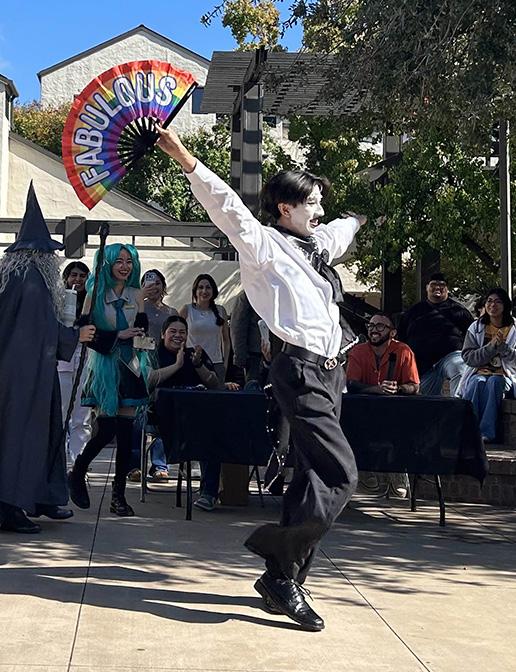
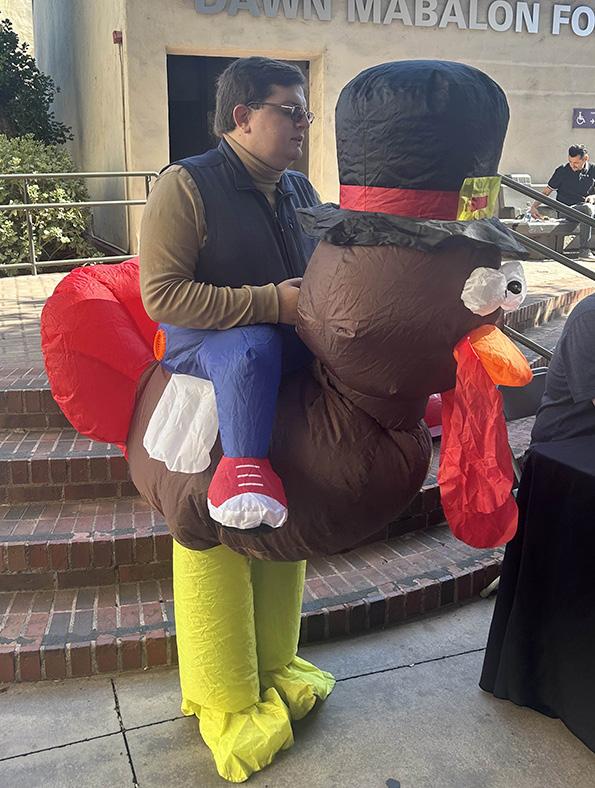

costume contest and the pumpkin pie eating contest, both open to anyone wanting to participate.
13 students competed in the costume contest, and there were many different costumes worn by the participants rang-
Above left: Tritan Vo, first palce winner of Gaylloween costume contest, dressed as “Dracula’s gay cousin” on Oct. 16 in the Quad.
Above right: Dylan Myers, Board of Trustees’ student representative, in a turkey costume at Gaylloween on Oct. 16 in the Quad. Left: Pumpkin pie eating contest on Oct. 16 in the Quad.
PHOTOS BY BELINDA SEIBEL
ing from a waffle, to a ghost, to Raven from “Teen Titans.”
Tritan Vo, EPIC club Inter Club Council representative,
won first place in the contest and referred to his costume as “Dracula’s gay cousin,” or just a gay vampire.
“I feel very uplifted that Delta’s community supports the LGBTQ community, especially with everything that’s happening right now. I’m glad I could be myself, I think that’s the best part,” said Vo.
His costume was partially handmade and he bedazzled the cape himself for a concert he had previously attended, and felt it went well with the vibe of a gay vampire.
The first place winner won a pair of Beats headphones, the second place winner won a bluetooth speaker and third place won a Stanley cup.
Jasmin Arroyo, student program specialist for the Pride Center, discussed the aftermath and the excitement for the event this year.
“Students are more engaged and are showing up even earlier, so I’m thinking College Hour is not enough time, I think we might need College Two-Hours, cause students were starting to show up as early as 11:20 [a.m.] and asking about what’s going on. Maybe in the future, obviously it’s College Hour, but I think maybe extending the time that we’re out here might be good,” said Arroyo.
BY ELIJAH PROSSER Senior Staff Writer
On Oct. 15 at 7 p.m. Delta hosted “The Fall Festival of Choirs” at the Atherton Auditorium.
The show was led by conductor Dr. Bruce Southard and pianist Matthew Baer.
The show included performances by the Delta Vocal Jazz, Delta Singers and Delta Concert Choir.
The first opening songs of the show were “Oye Como Va,” “I Say a Little Prayer” and “Ain’t No Sunshine,” all performed by Delta’s Vocal Jazz group.
The second group of songs played were “Chi la Gagliarda,” “Jenny Kiss’d Me,” “Weep, O Mine Eyes,” “Tipitin” and “Big Yellow Taxi.”
The last handful of songs for the Delta Concert
Choir group were “Magnificent Horses,” “Herbstlied,” “If Music Be the Food of Love” and “A Brand New Day” from the 1978 musical “The Wiz.”
“I think the main reason for this performance today was to kinda show what all of our ensembles are currently capable of and to let the audience look forward to what our winter performance will be like just like a taste test and reaching out through singing,” said Madison Klein, a member of the Delta Singers.
The performers were all wearing all black attire, a choice that comes down to professionalism.
“The all black is sort of just a professionalism thing,” said Klein. “I know Delta Singers has a special dress and it’s kinda just to make us look more like a cohesive unit considering we are like the audi-
tion group, but the all black is just more of a formal thing.”
Southard took the time to show gratitude for Jan Cariati, an Instructional Support Assistant working for the Arts, Humanities and Multimedia department.
“Jan has done so much for our department. She started shortly before we got sent home with COVID and just kept us running checking out tech packs to students. She keeps everything going for us, and I don’t know how I would get everything done without her. She helps just organizing and keep us together, but I rely on her heavily because she helps me with the music majors to making sure they are in the right classes,” said Southard after the show.
BY JOSELUIS HERRERA Staff Writer
HasTrunk-or-Treating replaced Trick-or-Treating?
Since the pandemic, it appears that for many families trunk-ortreating has replaced trick-or-treating as their way of celebrating Halloween, hindering the new generations’ experience of it.
Although Halloween is a time that most people my age use as an excuse to party their butts off or capture a couple of thirst traps, it was once a magical evening for children.
Trick-or-treating is magical, the costumes, the candy and the idea of walking around the neighborhood with friends and family, checking out others’ costumes, judging home decorations and searching for who has the best candy creates a spooky and adventurous environment that dazzled my young self.
This year the United States Census Bureau predicts that there are 133.2 million potential housing stops trickor-treat stops nationwide for trick-ortreaters, with an estimated 73.1 million children under the age of 18 who may elect to go door-to-door.
The alternative in recent years is trunk-or-treating. Trunk-or-treat events confine the Halloween spirit into America’s most priced destination — the parking lot.
Although it is seen as a safer and more convenient way for parents to celebrate with their children, its overly organized structure makes it a less spontaneously fun experience.
Trunk-or-treat events generally feature car displays where participants deck out their tailgates in themes like Jurassic Park, Nightmare Before Christmas, Barbie, or another hot topic of the year.
These events are usually organized by schools, churches or other local organizations, which can possibly filter its participants into specific demographics. This has clearly damaged community involvement in the traditional trick-ortreating and there are less house decorations with ghosts, vampires and many other Halloween icons.
The sheltered environment of trunkor-treating denies a child’s ability to live though natural and important experiences such as reading social cues, practicing how to dilute nervousness and learning how to communicate with others.
In an article posted on Children’s Minnesota website, Dr. Razaan Bryne, an outpatient pediatrician, said “trickor-treating is also a good opportunity for your child to learn about following rules, teaching them that if they’re under the age of 12, they should be accompanied by an adult, whether that’s you, a family friend or relative. They also

learn how to work with others which will be important as they go through school.”
Bryne also said the experience will teach them to always “use sidewalks or paths and to stay out of the street, unless at a safe crosswalk.”
After asking several students at Delta if they think trunk-or-treating provides a similar experience to the traditional way, they all answered no.
They also agreed that trick-or-treating has definitely been affected by the pandemic and the emergence of alternative outlets of celebration.
Aaron Mendoza, a student at Delta, went as far as saying that trunk-ortreating “ruins the whole joy and occasion.” I’m not saying people shouldn’t trunk-or-treat, all I’m saying is that trick-or-treating is a more beneficial and exciting experience for children.
BY JARRED WRIGHT Senior Staff Writer
Ballotsare out for Proposition 50, which asks California voters to approve newly-drawn voting districts to prevent the loss of five Democrat-held seats in the House of Representatives, following the passage of a Texas redistricting law passed along party lines.
In the face of a Republican Party that has become increasingly hostile to electoral democracy when it doesn’t work to their advantage, protecting free and fair elections is nothing short of an emergency.
The California ballot initiative, if passed, would be temporary, and control over the drawing of voter maps would
revert back to the Citizens Redistricting Commission after the 2030 census.
The Commission is independent and consists of five Democrats, five Republicans, and four members unaffiliated with either party when drawing maps. It is designed to represent voters without partisan bias.
In a perfect world, nonpartisan representation is what a representative government should aim for.
But we don’t live in a perfect world.
It would be a mistake to protect election integrity on the basis of an abstract ideal of fairness without doing what’s needed to make that fairness concrete — rebalancing the scales and evening the odds.
Prop. 50 was written in response to a redistricting proposal signed into law by Texas Governor Greg Abbott, one which breaks apart Democratic-majority voting districts in the state to cement Republican control over five additional seats in the House of Representatives.
“Today, I signed the One Big Beautiful Map into law. This map ensures fairer representation in Congress. Texas will be more RED in Congress,” Abbott said in an Aug. 29 X post.
According to reporting by the Texas Tribune, Abbott was originally opposed to the plan but agreed to it following pressure from the Department of Justice and a personal call from President Donald J.
Trump.
It seems that fairness, to Abbott, stems more from concentrating unchallenged Republican congressional power at the insistence of the President, not upon a nonpartisan representation of the electorate.
Redistricting can provide a federal advantage to Republicans in Congress hoping to get their agenda through a Congress where majorities have been narrow.
As of Oct. 20, 2025, the Republican Party holds a majority of only five members in the House. Adelita Grijalva, an Arizona Democrat who won a special election on Sept. 23, has still not been sworn in by Republican Speaker of the House Mike Johnson over a
month afterwards.
One can appeal to bare principles and argue that Democrats should not redistrict on an unfair partisan basis — full stop. This, however, abstracts away from the real consequence of not taking corrective action, which is a concession of power to a Republican party that has become cozy to advantageous partisan redistricting.
If elections are to be fair, Democrats cannot cede stolen ground, but must take back the advantage in the short term to keep the game of elections fair and equitable in the long term.
Election day in California is Nov. 4 and mail-in ballots can be turned in at any point before then.



Since the presidential inauguration, the United States has seen tariffs, deportations, attacks on civil rights, press freedoms - it’s devilish out there
BY ANDREA BALTODANO Editor-in-Chief
t’s Halloween. The candy is stale, the fake blood is drying, and the country is nine months into its latest horror sequel: President Donald J. Trump’s second term. We’ve seen enough to know the jump scares aren’t over. But this isn’t a movie and we don’t get to leave the theater (unless they kick us out). From ghosted protections to zombie policies, the Trump administration’s greatest hits have clawed their way out of the grave, and they’re coming for your rights, your future, and your
Here are some of the spookiest policies stalking the nation
The White House calls them “tariffs.” Let’s call them what they are: a tax dressed in red, white, and blue. Since returning to office, Trump has re-upped trade wars with China and slapped 15% tariffs on imports from Mexico and the EU, all in the name of “protecting American workers.”
But there’s nothing protective about paying more for food, clothes, or the laptop you need for class. These tariffs hit everyone who doesn’t own a multinational company. They trickle down fast: from shipping containers to store shelves to student wallets. Prices rise, paychecks shrink, and somehow the billionaires still cash in.
Yes, they’re back. Trump’s immigration policies have returned in full force under a sweeping executive order signed on Jan. 20, titled Securing Our Borders. The order authorizes mass detention, eliminates humanitarian parole programs, revives the Migrant Protection Protocols, and ramps up expedited removals.
It frames immigration as a “large-scale invasion” and directs federal agencies to act with “urgency and strength” to detain and deport as many people as possible, often without due process. From banning the CBP One app to proposing DNA collection from migrant families, the policies read less like governance and more like a dystopian screenplay. If cruelty is the point, this is the director’s cut.
In early 2025, the Trump administration’s Department of Education issued new directives emphasizing “patriotic education” and limiting diversity, equity, and inclusion programs in schools.
A February letter from the Office for Civil Rights warned that federal funding could be reviewed for institutions teaching content the department deems “divisive” or inconsistent with national values. This policy could discourage instruction on topics such as slavery, civil rights, and LGBTQ+ history. For colleges, this opens the door to curric-

ANDREA BALTODANO
ulum censorship and political interference, especially for ethnic studies and gender-focused programs.
This summer, NPR lost all federal funding. The White House called it a “budget correction.” But we must call it what it was: an attack on accessible truth. NPR and PBS have long been lifelines for underserved communities, students, and independent thinkers.
“Which viewpoints NPR and PBS promote does not matter. What does matter is that neither entity presents a fair, accurate, or unbiased portrayal of current events to taxpaying citizens,” the executive order reads.
Now, in the age of AI-generated news and deepfakes, we’ve pulled the plug on one of the few remaining platforms with journalistic integrity. So here we are. Nine months in, and the Trumpening is fully underway.
Forget the masks, the haunted houses, the jump scares. The real American horror is happening in plain sight, written in law, signed by executive order, and felt by students, families, and voters who are too exhausted to scream.
The scariest part? We’ve still got three years left.



BY
The Delta College Mustangs boast a 4-3 overall record and a 1-1 record in conference play so far this year. The last time the Mustangs had four wins in 2019, two of them came during November, the last month of the season.
Starting Quarterback Ubedei McGautha credits the success to heightened levels of camaraderie.
“We know that we can rely on each other to pick ourselves up and have our backs each play,” said McGautha The Mustangs are proving themselves this year, averaging 37 points a game while only giving up 18 points a game, showing skill on both sides of the ball.
A key factor in the Mustangs’ success has been Sophomore Defensive Back Dinero Burgess. Burgess has four interceptions in six games, as well as 18 tackles.
BY CAMRY TURNER Staff Writer
The Delta College Mustangs continued its undefeated season with a decisive sweep over the Diablo Valley Vikings on Friday, Oct. 17, winning 25–12, 25–4 and 25–6 at home. The Mustangs’ performance showcased precision, teamwork and consistency, reflecting a squad focused on more than just the scoreboard.
Delta opened the match strong, gaining an early 3–0 lead within the first two minutes and quickly setting the tone. The Mustangs worked the court efficiently, communicating and covering each other across plays.
Midway through the first set, Diablo Valley’s No. 12 made a diving save attempt but fell short, sealing the Mustangs’ 25–12 win.
The second set was all Delta. As “Blow the Whistle” by Too $hort played through the gym speakers, the Mustangs dominated from start to finish, taking the set 25–4.
Outside hitter Louise Oliveira and middle blocker Mia Lomia led with intensity at the net, while the team maintained its trademark composure.
“The essence of tonight’s game was hard work and dedication,” said Lomia, “just knowing that we have to keep it focused on our side of the court, keep it super high energy, and support each other to make it fun.”
By the third set, Delta showed no signs of slowing down. No. 10 and No. 23 displayed sharp blocking that shut down multiple Viking attacks. The match point came when No. 9 set the ball, No. 21 bumped it, and No. 24 spiked it clean over the net to secure
the sweep, 25–6.
Oliveira, who landed several key kills, credited the team’s chemistry and discipline.
“We push each other every day to play good and feel good,” said Oliveria, “we know that we have a target on our back since we’re 8–0, so everybody wants to beat us. We have to work hard to be the team we are today.”
Despite the dominance, the Mustangs’ mindset remains grounded.
“If you look at our winning record right now, it shows how hard we work to get where we are,” said Lomia, “we push each other in practice to better each other, and it moves on to the court on game day.”
The Mustangs, now 9–0 overall, will face Folsom Lake on Wednesday, Oct. 22.
“A key factor is definitely my position coach, Coach Orth,” said Burgess when asked what a key to his success was. “He has already been at the division one level, so he knows what it takes to be great.”
On the offensive side of the ball, freshman running back Maurice Griffin Jr. has been on a roll, averaging 141.7 yards per game with seven receiving touchdowns and one rushing touchdown.
The Mustangs continue to keep their eye on the prize, aiming to bring a bowl back to Delta.
“We also have a goal in our mind to make a bowl game, so striving for that has also pushed us even more to go after it,” said McGautha “everyday from practice to each play in the games and that’s something that hasn’t been done in a decade so we’re looking to bring that winning football tradition back home to Delta.”
The Mustangs have three more games this season, with their next game being at home Oct. 25.
BY JEWELS ESTRADA Staff Writer
Men’s and women’s cross country coach Lauryn Jordan Seales said the season is going well with steady progress in both squads. Seales noted three standout athletes who have been leading this season.
“Our women’s team recently placed 6th at the Modesto JC Invitational, led by Francisca Eguiluz-Serrano, who finished 28th overall but has MUCH MORE in the tank after she ran a[n] astounding 19:48 in the 5k a few weeks back,” said Seales, in an email interview.
“On the men’s side, we finished 5th as a team, led by freshman Michael Pelaez, who ran an impressive PR of 20:24 in the 4-mile, closely followed by sophomore Andrew Morales in 20:26.”
In order to keep the team motivated before meets, Seales said the team works to have a positive environment and stay team-focused.
“Reviewing race strategies, sharing individual goals, and reminding each athlete of their progress. I also emphasize competing for one another and staying composed when the race gets tough,” said Seales.
The most recent team meet was on Oct. 18, at Badlands Park in Sunnyvale. The men’s team ran an 8K and the women’s team ran a 6K. The result of the scoring for the team was led by three standout athletes.
Out of 209 runners freshman Pelaez was 23rd place with a time of 25:45.0 and sophomore Morales 43rd place with a time of 26:16.2. The women’s team was led by sophomore Eguiluz-Serrano. Out of 123 runners Eguiluz-Serrano placed 82nd place with a time of 26:07.7.
Morales, 19, said he trains his mind and body for each meet. Morales balances his studies, work, commuting, and running. With resilience Morales works
hard to meet his running goals which he said he believes will lead him to doing well at state.
“I get into my mindset by really focusing on how I’m going to run my race mentally. The day before a meet, I typically run only four miles and do a few strides, then use the normatec and roll out in order to feel fresh for the race the day after,” said Morales.
Morales’ steady scores and experience in each meet shows how he is reliable to the men’s team.
Pelaez, 18 said he strategizes improving his performance, motivation, and action to best show his abilities while running at Delta.
“Before a meet, often the day before, I cut back on training and try to come up some type of plan or pacing strategy. Throughout the season I try to build my weekly milage/intensity and only taper for big meets or qualifiers, like state,” said Pelaez, in a text message interview.
Pelaez said his season is progressing well but notes actions he can take to increase his performance.
“My increase in training has allowed my performance to become much better from high school. However, I still have a long way to go before I’m satisfied,” said Pelaez. “I feel I need to improve on everything. My speed, endurance, and strength are still far from ideal. But I’m working to improve!”
Eguiluz-Serrano, 19, emphasizes the importance of rest and recovery, focusing on hydration, sleep and recovery’s importance to running.
“Mondays and Tuesdays would be the most important days as they consist of Tempos and Interval workouts that prepare us to push the pace, and be uncomfortable. Of course, recovery is just as important because your body gets faster when it heals, and not just when it’s being put under stress,” said Eguiluz-Serrano.
The Mustangs next meet is the Big 8 Conference

Championships on Oct. 30 at Tuolumne Regional Park, Modesto.
BY ELIJAH PROSSER Senior Staff Writer
On Oct. 14, the Mustangs soccer team took on Diablo Valley at home winning 4-1 improving their overall record to 3-4-3 in the season.
Diablo being the visiting team start with the ball. Then at 5 minutes Mustang player No. 5 defender Bianca Shelton scored the first goal. Then later on No. 15 midfielder Samantha Arong scored a goal assisted by No. 7 midfielder Alexis Magdaleno.
Since Delta was on a 2-0 run it seemed like Diablo was going to go scoreless before the first half ended but then No. 21 Hannah Walden scored a goal assisted by No. 27 Midfielder Alina Rodriguez to end the first half.
In the second half, Delta scored its fourth goal from No.24 Midfielder Macie Jarquin assisted from the team.
In the last minutes of the game, Diablo Valley seemed to not have any fight in them and No. 4.
Defender Madeleine Iniguez scored the team’s
final goal to put the final nail in the coffin for Diablo.
The team is trying to find both its footing and wins under new interim head coach Carmen Padilla
“I felt that overall everyone was able to contribute today and everyone was able to get in to help the time get a win at home,” said Padilla. “We talked a lot about protecting home. Currently, right now, we’re undefeated at home — that’s something we take pride in. We need to improve on being a little bit more lethal in the final third making sure that when we finish our chances and taking a bit more shots that’s what we focus on this week.”
Since beating Diablo Valley, the Mustangs earned their first Big 8 conference win and they stay undefeated at their home turf.
The Mustangs have five games left of the regular season and currently are trying to make it to the playoffs.
Their next game is Oct. 24 against Folsom Lake at Delta College.
